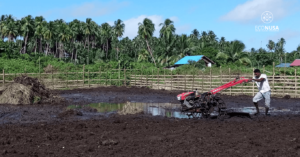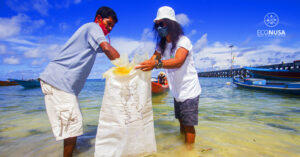
The struggle of indigenous community to get recognition of their customary land and rights keeps going. The endeavor involves customary leaders and many other stakeholders who have concerns with their existence. It also happens in Sorong, West Papua Province.
The issuance of Regional Regulation No. 10/2017 on the recognition and protection of Moi indigenous community at Sorong Regency has urged government and some parties to ensure the legal existence of indigenous community and their rights. In this respect, Malaumkarta Youth Generation Group(PGM) in collaboration with EcoNusa Foundation conducted mapping of Moi sub tribe’s customary lands. There are 14 clans of 6 villages, namely Malaumkarta, Mibi, Suatut, Sutolo, Wenbulun and Malagufuk at Sorong Regency. The mapping also includes inventory of potentials and arrangement of customary land management plan.
EcoNusa facilitated formal process of area registration at regency, province and central levels so as to run based on constitution and not to breach customary rule. That was addressed during the Focus Group Discussion (FGD) on the Development of Malaumkarta Customary Area Management in Sorong on 22 February 2021.
However, there were always obstacle and challenge to put up with during the process of acquiring recognition of indigenous community rights. There was gap among elderly custom leaders with know-how of customary land and young generation who has neglected their customary land and its culture.
An elderly customary leader of Malasamuk clan, Spenyer, said that there were some local figures representing clans of Moi Kelim tribe who had passed away. On the other hand, customary school such as Sekolah Adat Kambik (Kambik School of Tradition) does no longer exist. “Young peoples from 14 clans seem to have no interest to learn their tradition,” said Spenyer.
“We are confused if there will be no one who will continue Moi Kelim tradition. We must not lose one next generation to revive the tradition because there is no more school of tradition,” said Torianus Kalami, the PGM chairman.
The tradition leaders shared that they used to get education on tradition from generation to generation through school of tradition. The school has different fields, such as religious and culture subject, medicine, agriculture and traditional law. Formerly, there was Kambik School of Tradition in Sorong. But now the school does no longer exist along with the development of social and politics in Tanah Papua.
The tradition leaders usually come from the last generation of the school of tradition of each clan. “The problem is that the young generations are no longer interested in customary issues. Moi tribe tradition leaders did not transfer their tradition knowledge to the next generation,” said Tori.
The existence of PGM and EcoNusa is intended to call young people to pay attention to their own customary areas. The elderly leaders looked enthusiastically when they assisted young Moi Kelim tribe to make use of technology to ensure their customary territorial.
Now the young generation has been interested to use formal way, in addition to school of tradition, so as to preserve the tradition entity through forests and customary land. This includes the possession of territorial border, ritual, culture, medicine and local wisdom they owned.
“They learn to adopt technology so as to do customary land mapping. Thus, they will protect tradition and local culture resources. They will refer to the legal directive and formal method and the updated mapping technology,” said Darkono Tjawikrama, EcoNusa’s Research and GIS Manager.
As to Darkono, they learned to use Global Positioning System (GPS) device to map Moi Kelim customary land. The results will be submitted to the government through formal registration. Upon having mandate from local leader, they planned the management that involved 14 clans in compliance with local wisdom.
These 14 clans have customary lands whose ownership needs recognition. These clans are Mobalen, Kalami Kining Pilik, Kalami Malagufuk, Kalami Klagalas, Kalami Malasili, Kalami Tiloke, Magablo Klasouw, Magablo Gauk, Magablo Lingswok, Malasamuk, Sapisa, Ulimpa, Su Klalouk and Mobalen Gauk.
In this case, there are some stages facilitated by EcoNusa. These were set off by preparing customary land mapping, building consolidation and commitment among elements. Next stages are preparing institution and document on customary forest proposition, integration of customary forests scheme proposition to spatial planning and regional government to central government. The last stage is the development of customary land management planning.
Editor: Leo Wahyudi




